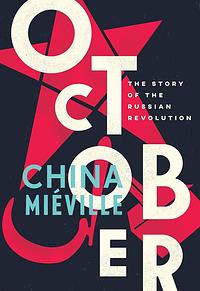Take a photo of a barcode or cover
challenging
informative
slow-paced
I picked up this book as someone who knew what could be described as little to nothing about the Bolshevik Revolution. I wanted to get an idea of what exactly went down, along with some interpretation, and this book had been recommended to me by multiple folks, so it seemed like a perfect pick. What I would say now, is I am looking forward to rereading this book probably in the next year or so.
Here's why.
Miéville’s writing style was really unexpected. He’s prosaic and literary. His vocabulary is advanced; after a certain point, I started keeping a note of all the words I wanted to learn. He also is a very subtle and implicative writer. He loves to finish a section either alluding to what comes next, sitting with some dry humor, or—most challenging for me—gesturing at the consequences of a thing without being explicit. Normally, I would be all about that. But, in this circumstance, where I’m coming in with a lack of knowledge, I feel like a good chunk of that was lost on me.
In the book’s defense, I also set myself up for failure. I hoped this would be my next before-bedtime read, but that is not at all what this book demanded of me. Again, for someone else with more advanced vocabulary and/or context, October might fit that bill, but I trudged along blearily for far too long. Once I turned it into my daytime active-reading book, things definitely improved.
Moving on! Some people might not know this (I did not), but it seems that the cast of characters playing in the Bolshevik Revolution is enormous. Kind of similarly to the vocabulary, I had to stop and think about what it meant that a person cast his vote in a certain way—I even had the gall to think to myself that I should make a list and some notes each time a person was introduced. There is literally a section of this book including just that. And I forgot about it until I was probably two thirds of the way through. Oops!
So, after I watch a few videos or talk to some folks to get some more context, I’m excited to take a second swing at this and see what I missed. Even though I’m slightly too short to ride this ride, Miéville’s prose is undeniably good; this book is dripping with powerful lines.
Given my caveats, here’s what I’ve pulled from my reading, which I’m probably going to compare to the Troubles and the Cuban Revolution, literally only because those are what I’ve read about recently. These guys loved voting. They loved the political processes. The politicking itself, the propogand-aing and speech-giving and letter-writing. They were entrenched in the nitty-gritty of philosophy and how and why things should happen. I was shocked by how frequently so many people sort of made the compromise not to revolt just yet, because now was the time to lockstep with the bourgeoise, because the proletariat and the peasantry still needed their political backing. And then the people who made those decisions would have to convince the layperson that it was, in fact, the right move (tangentially, I would be really interested in seeing the perspective of this revolution from the layperson’s perspective). As Miéville gets around to pointing out, they are people with their own thoughts, and although they idolize Lenin, they are still autonomous. The peasants did not care that it wasn’t time to revolt when they were literally revolting.
In comparison to the Troubles, which were drawn out for a much longer period of time, at least from what I understand, it seems like there wasn’t as much philosophizing, and certainly much less forum-style politicking, probably because Northern Ireland was more occupied territory/warzone, whereas Russia’s cities experienced more brief periods of violence juxtaposed with the continuance everyday life (it was really jarring to read that people were literally just hanging out and going to shops while the revolution was going down). I could also be wrong about the philosophizing now that I think about it. I’m remembering some of the big names of the IRA doing their fair share of letter-writing, and rhetoric around hunger striking being a big deal. It does still seem that the Bolsheviks were more invested in the politics side of things, though, while the IRA’s primary interest was ousting and independence. Also, see Gerry Adams’ dramatic turn from radical revolutionary to blah politician.
Moving on, I’m really interested to build some context around why Lenin was so beloved, as well as what happened directly after the revolution. Miéville does an accelerated version as an epilogue, but I’d love to see some of the specifics there. Tangentially, also interested in German resistance in the 1900s, just because of how frequently they’re referred to here. In summary, October is great! It’ll be even better, I’m sure, when I take another stab at it.
This book was definitely not for me. I have a couple of political books I hoped to read this year and after reading this one I have low hopes for reading them. It’s not a bad book. It’s very informative but everything I read I felt like I wasn’t retaining it. I think I’ll be coming back to this one maybe in a year or two in hopes to understand it better.
Loved it - helped me realize I knew next to nothing about the revolution, and has left me feeling encouraged to learn more. I'll be revisiting this one!
adventurous
challenging
dark
emotional
funny
informative
reflective
sad
slow-paced
challenging
informative
inspiring
slow-paced
informative
slow-paced
adventurous
challenging
reflective
tense
medium-paced
adventurous
informative
slow-paced
informative
reflective
fast-paced
just really interesting how there were so many different factions of socialists and communists fighting eachother




